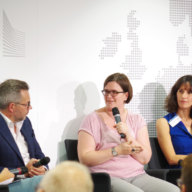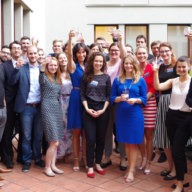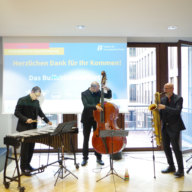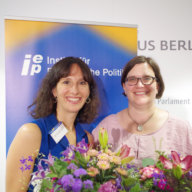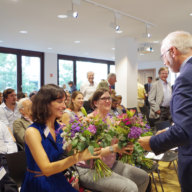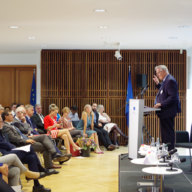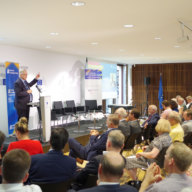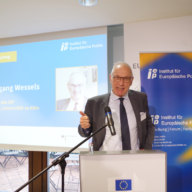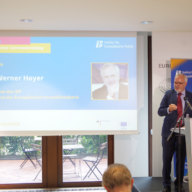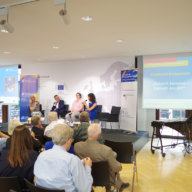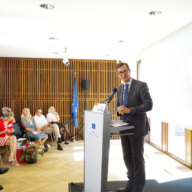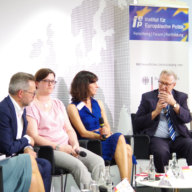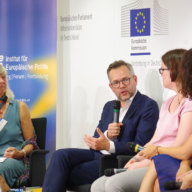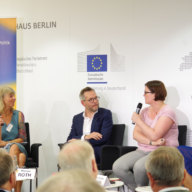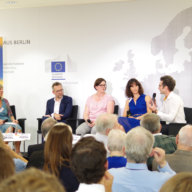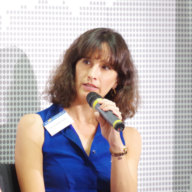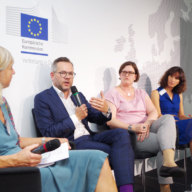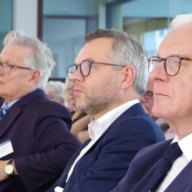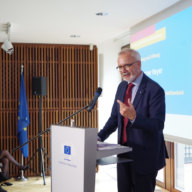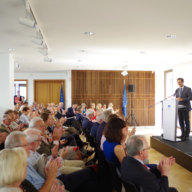European Summer Reception of the IEP
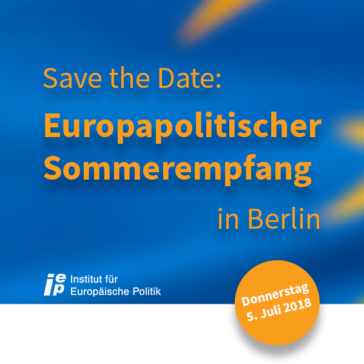
After 23 fruitful years, Prof. Dr. Mathias Jopp handed over the directorate of the Institut für Europäische Politik (IEP) to Dr. Katrin Böttger and Dr. Funda Tekin on 1 July 2018. The ceremony took place on 5 July 2018 at the Representation of the European Commission in Germany.
At the outset of the event, Richard Kühnel, Head of the Representation of the European Commission in Germany, welcomed the speakers and guests. He thanked Jopp for his personal engagement and successful work at the IEP. Being an enthusiastic European citizen, he had shaped and influenced the political Berlin and strengthened the civil dialog significantly with his initiative “IEP Public Debates”.
Fishbowl discussion
Following Richard Kühnels speech, Dr. Werner Hoyer, President of the IEP, introduced the fishbowl discussion with the Minister of State for Europe at the German Federal Foreign Office, Michael Roth, member of the German Bundestag, and the new directors of IEP Böttger and Tekin – moderated by Annette Riedel, correspondent of Deutschlandfunk in Berlin. In his opening statement, Hoyer emphasised the necessity of a closer cooperation within the EU. Eminently important in that is the involvement of the civil society and younger generation in the political discourse.
“The future of Europe – The future of the IEP” was the topic of the fishbowl discussion. Minister of State Roth highlighted that nowadays Europe was taken for granted too often. Therefore, true Europeans, like Mathias Jopp, were needed to strengthen the emotional bond between politics and civil society for it to restore and regain the lost trust of society.
The three panelists agreed on the requisiteness to further implementing strong measures, to tackle the migration and refugee crisis. The Dublin agreement had been highly beneficial for Germany for a very long time. Hence, now it would be time for Germany to contribute one’s share financial and political wise. Questioning which partners were reliable to drive the European idea, Middle and Eastern European states needed to be strongly incorporated, as they did not always have the fundamental consensus of a strong united Europe. Addressing Brexit, Minister of State Roth observed that the United Kingdom leaving the EU would be a loss, but at the same time had the potential for a healthy shock for the EU and the UK alike.
Concluding the fishbowl discussion, the Minister of State raised the question of possibilities and chances to counteract Euroscepticism and demanded solutions for raising the enthusiasm of civil society for a future-oriented Europe again. Funda Tekin emphasised the visions for Europe which the IEP is working on while referring to the IEP projects “TruLies” and “Alternative Europe!”. “TruLies” did fact checks of populist parties’ statements while “Alternative Europe!” published a manifest for visions for Europe. Profound and fact-based Social Media was an accompanying but essential instrument for both directors. The IEP would continue and even intensify the provision of information via Twitter, Facebook and other online presences.
Tekin mentioned the exceptional challenge to integrate the entire civil society in the political discourse. A research institution like the IEP needed to carry out an important contribution to achieve this goal. Böttger summarised that “Europe is the solution, not the problem!”.
Ceremonial addresses on the occasion of Matthias Jopp handing over the directory
The President of IEP Hoyer expressed his thoughts on Mathias Jopp’s career in view of European integration. Citizens were often not aware of the cornerstones of integration, namely peace, freedom and welfare. Serious matters of security policy problems tended to make these key areas even more important. The IEP would continue contributing to deepen the European integration.
Prof. Dr. Wolfgang Wessels, chairman of the IEP, described Jopp as an “Entrepreneur, manager, architect, networker, academic teacher, inquisitive and curious person and active and engaged European citizen”. He perpetually prompted the brisk exchange between politics and economy. For his future position as Head of International Programmes, Wessels wished Jopp all the best and a fruitful time. He would look forward to the collaboration with the new directors.
In his closing statement, Jopp advocated more political discourse between the politicians and the civil society. This seems to be fundamental for prosperous work of a research institute. In todays strained political situation, the EU-27 needed to move closer together once more. The European Security and Defense Policy, as well as the protection of European boarders had to be expanded. Concluding, he struck a positive balance looking at the past 23 years and was looking forward to the new era of the two directors.
The videostream of the event can be accessed online through Periscope.
